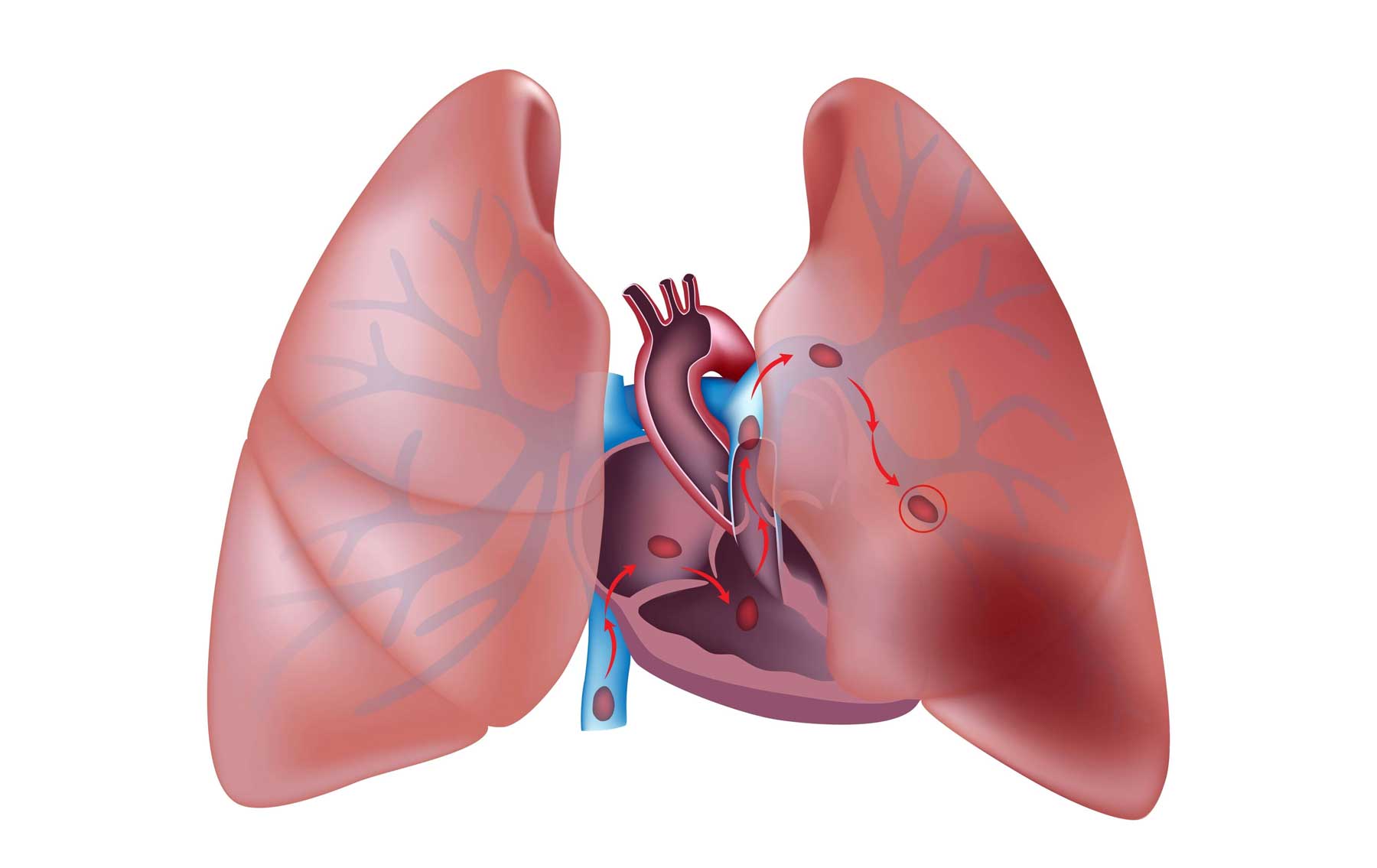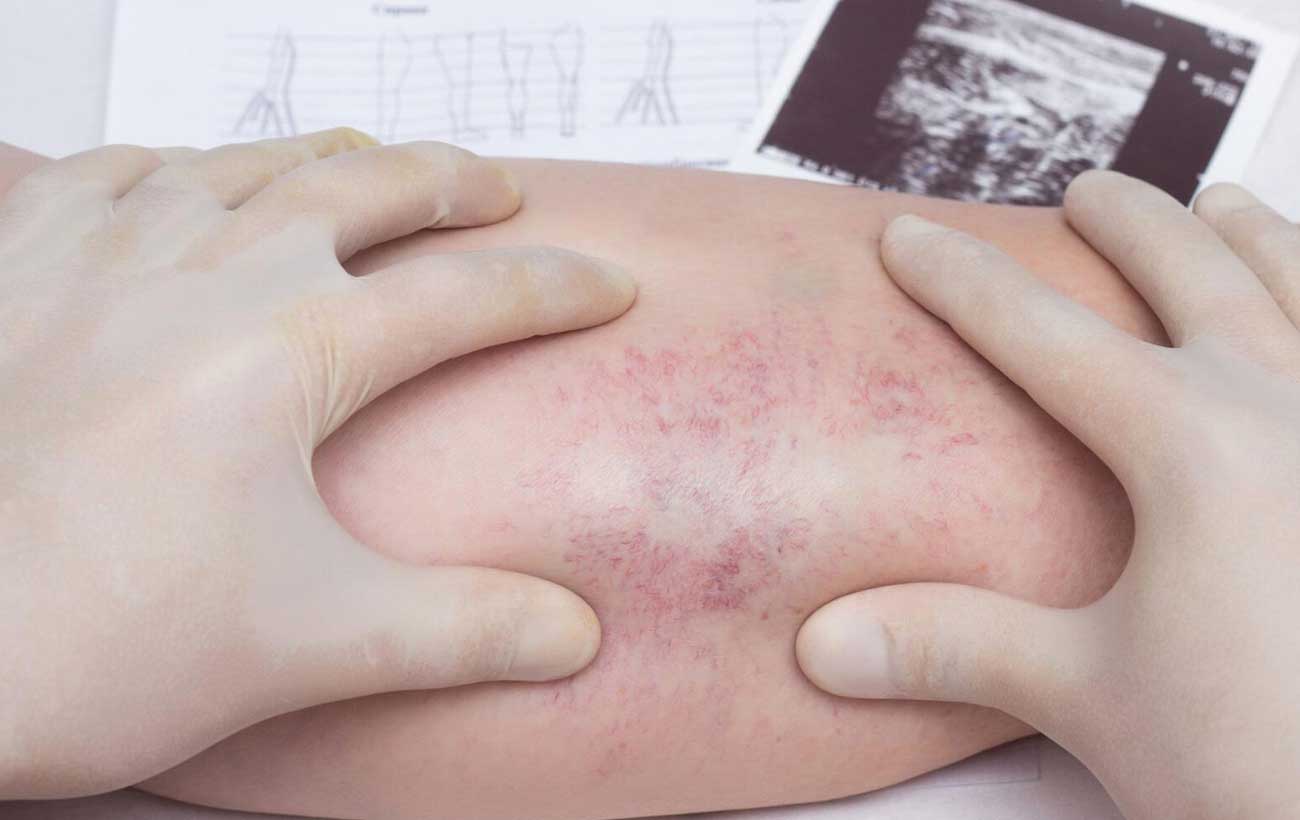Deep Vein Thrombosis Thrombosis is the formation of a blood clot (thrombus), which can partially…

High Blood Pressure
Blood pressure is produced by the heart as it pumps blood through the arteries and as the arteries resist blood flow. It is measured in millimeters of mercury (mm Hg) with an instrument called a sphygmomanometer. Blood pressure is highest when the heart contracts (beats) and pumps blood into the arteries. This is the systolic pressure. Between beats, when the heart is resting, the pressure falls. This is the diastolic pressure. A blood pressure reading is given as a combination of these two pressures; the systolic pressure is written above or before the diastolic pressure. For example, if your blood pressure reading is 130 over 80, it is written as 130/80 mm Hg; 130 is the systolic pressure and 80 is the diastolic pressure.
In healthy people, blood pressure varies throughout the day, depending on factors such as physical activity and stress. In people who have high blood pressure, the heart always pumps with greater force than necessary, regardless of other factors, and blood pressure is never within the normal range. The medical term for high blood pressure is hypertension.
High blood pressure is a very common condition, affecting about 50 million adults in the United States. Because it seldom causes symptoms, many people who have high blood pressure do not know that they have it. However, in most cases, high blood pressure is easy for doctors to detect and treat.
The cause of high blood pressure is usually unknown. This is called primary or essential hypertension. Most people who have high blood pressure have essential hypertension. Although essential hypertension can’t be cured, it can be controlled. Hypertension that results from an underlying disease or condition—such as long-term kidney disease, thyroid disease, adrenal gland abnormalities, or use of illicit drugs—is called secondary hypertension. Secondary hypertension can be cured by successfully treating the underlying disease or condition.
In most people who have hypertension, blood pressure continues to rise over time unless it is treated. Sometimes, however, significantly high blood pressure develops very quickly. This life-threatening condition, which can result from either essential hypertension or secondary hypertension, is called malignant hypertension. Untreated malignant hypertension can lead rapidly to stroke, kidney failure, or heart failure.
Risk Factors
Although the cause of high blood pressure is usually unknown, a number of factors can increase your chances of developing high blood pressure or worsen existing high blood pressure:
-
- You have close family members (parents or siblings) who have high blood pressure.
- You are male.
- You are female and past menopause.
- You are black.
- You are overweight.
- You do not exercise regularly.
- You use any tobacco products (including smokeless tobacco).
- You regularly consume more than two alcoholic drinks per day.
- You have diabetes or long-term kidney disease.
- You are not able to cope with stress.
Symptoms
In the early stages, high blood pressure usually does not produce symptoms. By the time symptoms such as severe headaches, palpitations (heartbeats that you’re aware of), or shortness of breath occur, the disease has already caused organ damage. Therefore, it is vital to monitor your blood pressure and have it checked every time you visit your doctor, especially if you have any of the risk factors for hypertension described above.
If not treated, high blood pressure can lead to the following health problems, even if you don’t have any symptoms:
-
- Atherosclerosis. Uncontrolled high blood pressure causes the artery walls to thicken and lose elasticity, which promotes formation of hardened fatty deposits (plaque) in artery walls. Plaque narrows the channel inside the artery and interferes with blood flow throughout the body. Over time, atherosclerosis can lead to a heart attack or stroke.
- Enlarged heart. High blood pressure makes the heart work harder. Over time, this extra effort causes the heart muscle to thicken. The heart becomes less efficient and has to work harder and harder to pump blood through the body, potentially leading to heart failure.
- Kidney damage. the kidneys filter waste from the blood. Over time, high blood pressure can cause the blood vessels in the kidneys to narrow and thicken. The kidneys then filter less blood, and waste builds up in the bloodstream, sometimes leading to kidney failure. A person with kidney failure may need dialysis (a technique to remove waste from the blood) or a kidney transplant.
- Stroke. High blood pressure can weaken the walls of the arteries or cause them to thicken. A weakened artery wall in the brain may break, causing a hemorrhage. A blood clot may block one of the narrowed arteries in the brain, causing a stroke.
- Eye damage. High blood pressure can damage blood vessels in the eyes, causing them to thicken, narrow, or tear. This damage can lead to loss of vision.
Treatments
When the underlying cause of secondary hypertension is treated successfully, blood pressure usually returns to normal levels. However, if the underlying cause cannot be cured, treatment is usually the same as that for essential hypertension.
Lifestyle changes
For many people, lifestyle changes such as giving up tobacco, following a healthy diet, exercising regularly, losing weight, and managing stress not only decrease the risk of developing high blood pressure but also significantly reduce existing high blood pressure. However, if lifestyle changes do not lower blood pressure to within the normal range, the doctor will probably recommend treatment with antihypertensive drugs.
Medication
Doctors usually prescribe antihypertensive medication when high blood pressure cannot be controlled with lifestyle changes. Most people who take antihypertensive medication need to take it for the rest of their life.
The following list provides a brief description of the most frequently prescribed types of antihypertensive medications.
-
- Diuretics. Diuretics increase the kidneys’ excretion of water and sodium, reducing the volume of blood the heart has to pump, thereby reducing blood pressure.
- Beta blockers. Beta blockers slow the heart rate and block the output of an enzyme that raises blood pressure.
- Alpha blockers. Alpha blockers prevent arteries from constricting and block the effects of the stress hormone epinephrine, which raises blood pressure.
- ACE inhibitors. ACE (angiotensin-converting enzyme) inhibitors block production of an enzyme (ACE) that causes blood vessels to constrict.
- Angiotensin-receptor blockers. Angiotensin-receptor blockers prevent the arteries from constricting and prevent the kidneys from retaining sodium and water, which can raise blood pressure.
- Centrally acting drugs. Centrally acting drugs work directly on the brain and nervous system to prevent arteries from constricting, lowering heart rate and blood pressure.
- Calcium channel blockers. Calcium channel blockers prevent the smooth muscle of the artery walls from contracting and narrowing the blood vessels; calcium channel blockers may also slow or block the development of plaque, which can build up on artery walls and narrow them.
Take your medication exactly as your doctor prescribes it; follow his or her instructions carefully and completely. If you experience any unpleasant side effects, talk to your doctor right away. He or she will work with you to fine-tune your drug treatment program so that your blood pressure is controlled without unpleasant side effects. Never change the dosage or stop taking any medication until your doctor tells you to do so. If the cost of your medication is a concern, ask your doctor or pharmacist if less expensive alternatives are available.
After your blood pressure is under control, you may be tempted to stop taking your medication. But keep in mind that there is no cure for essential hypertension and that normal blood pressure readings are a sign that the medication is working. If you stop taking it, your blood pressure will rise again.
Preventing High Blood Pressure
You can lower your risk of developing high blood pressure or lower existing high blood pressure by doing the following:
-
- Maintain a healthy weight. As your body weight increases, your blood pressure rises. Being overweight can make you more likely to develop high blood pressure than a person who is at a healthy weight. You can reduce your risk of high blood pressure by losing weight. Even a small weight loss can reduce your risk significantly. And if you are overweight and already have hypertension, losing weight can help you lower your blood pressure.
- Exercise regularly. Regular exercise is an effective way to lose weight and control blood pressure. When combined with a healthy diet, regular exercise can help you lose more weight and keep it off longer than with either diet or exercise alone. Aerobic exercise—such as walking, cycling, swimming, stair-climbing, or jogging—helps improve the fitness of your heart, blood vessels, and lungs, which, in turn, helps lower your blood pressure and protect you against heart disease.
The benefits of exercise
Regular aerobic exercise, such as step aerobics and jogging, and strength training, such as lifting weights, provide many health benefits—including protection against high blood pressure, heart disease, type 2 diabetes, and osteoporosis. Regular exercise helps you condition your heart and lungs, improve your strength and endurance, and maintain a healthy weight.
-
- Cut down on salt. Most Americans take in more sodium than they need. Excess salt causes your body to retain water, which raises blood volume and therefore blood pressure. If you are salt-sensitive, which means that your blood pressure rises when you eat salt, eating less salt—no more than 1 teaspoon per day—will benefit your health.
- Limit alcohol. Drinking too much alcohol will raise your blood pressure temporarily and, over time, may also lead to high blood pressure. Limit yourself to one drink a day if you are a woman or two drinks a day if you are a man. A drink is defined as 1½ ounces of 80-proof liquor, 5 ounces of wine, or 12 ounces of beer.
- Do not use tobacco. Smoking puts you at risk of developing high blood pressure or having a heart attack or stroke. Smoking also worsens a person’s cholesterol profile, which is a factor in heart disease. Chemicals in smokeless tobacco can also raise blood pressure.
Other factors that may help prevent high blood pressure in some people include:
-
- Potassium. Having an adequate level of potassium in the body may help prevent high blood pressure by balancing the amount of sodium in the body. Good sources of potassium include fresh fruits and vegetables (especially bananas, oranges, melons, and potatoes), low-fat or fat-free dairy products, and fish. Do not take potassium supplements unless your doctor recommends them. Too much potassium can cause an irregular heartbeat.
- Calcium. Too little calcium in the diet may lead to high blood pressure (as well as weak bones). You can get the calcium you need—1,200 to 1,500 milligrams per day for adults—from low-fat and fat-free dairy products such as milk, yogurt, and cheese, and green leafy vegetables. Doctors do not recommend taking calcium supplements to help prevent high blood pressure.
- Magnesium. A diet low in magnesium may increase blood pressure. The best sources of magnesium are whole grains, green leafy vegetables, seeds, nuts, and dried peas and beans. Doctors do not recommend taking magnesium supplements to help prevent high blood pressure.
- Fish oils. Omega-3 fatty acids are a type of fat found in fatty fish such as mackerel and salmon. These oils help protect the lining of arteries, prevent irregular heart rhythms, and reduce the formation of blood clots. Eating fish two or more times a week can also help reduce high blood pressure and improve your cholesterol profile.
- Fat and cholesterol. To help prevent heart disease, limit the amount of fat in your diet, especially the saturated fat found in foods such as fatty meats and full-fat dairy products. Too much saturated fat raises your blood cholesterol level, which increases your risk of developing heart disease. High-fat foods are usually high in calories.
- Caffeine. Although caffeine in coffee, tea, and soft drinks may raise blood pressure temporarily in some people, it quickly returns to its usual level. Limit your caffeine intake if your doctor recommends it.
- Stress management. Stress can raise blood pressure temporarily and can aggravate existing high blood pressure, making it more difficult to control. Although stress management techniques—such as biofeedback, meditation, or relaxation training—do not help prevent high blood pressure, they may help you deal positively with the stress in your life. Getting enough sleep can also be helpful.



